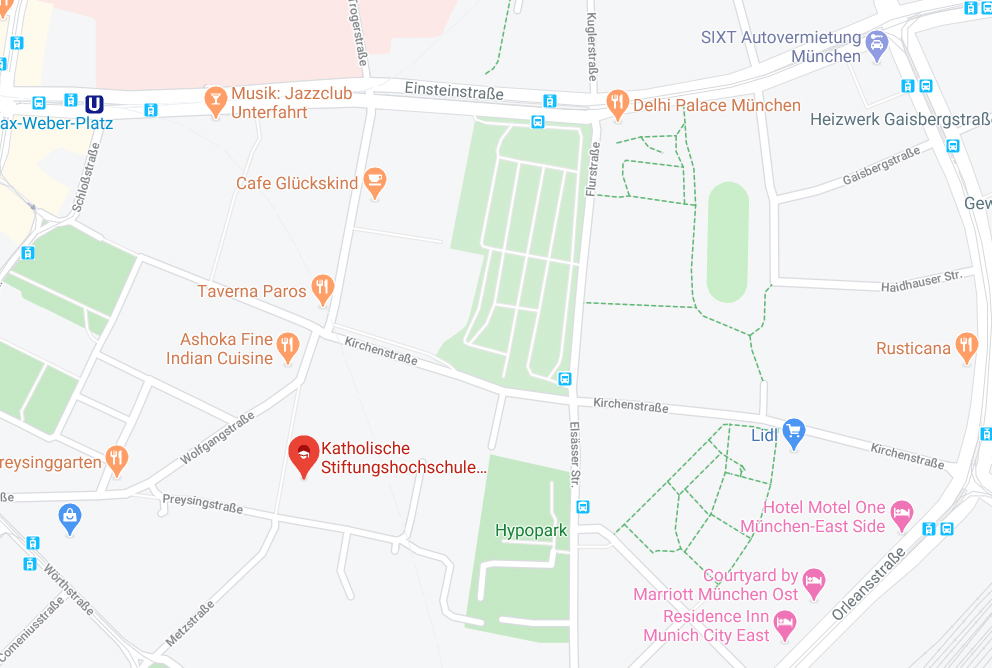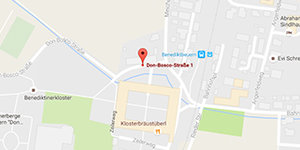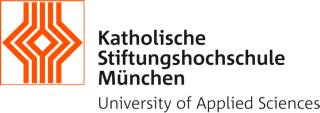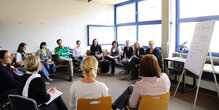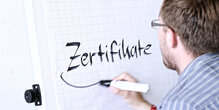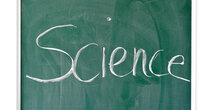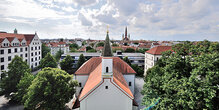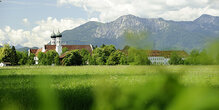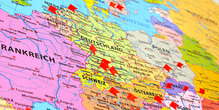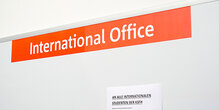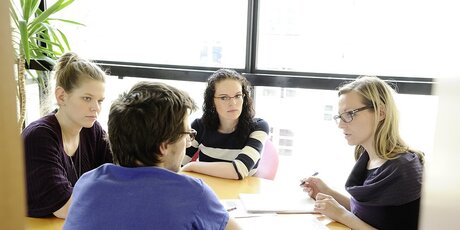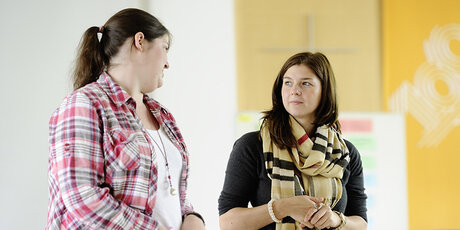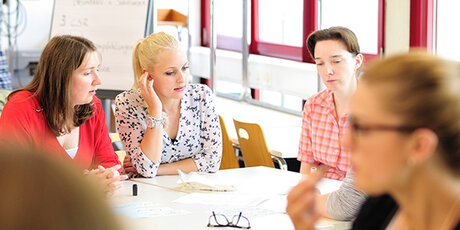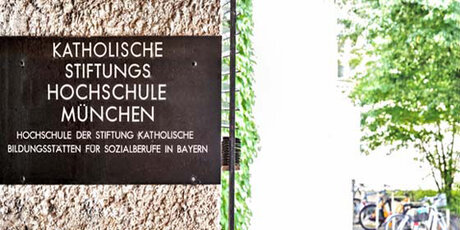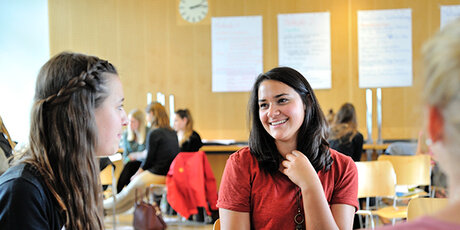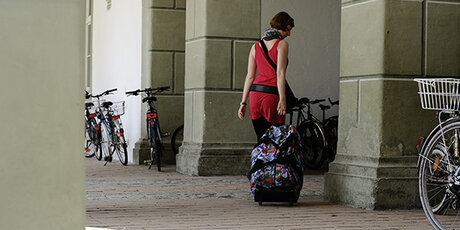Early Childhood Education and Care (B.A.)
Study location
Munich
Faculty
Social Work, Munich
Dean of the Faculty
Prof. Dr. Jochen Ribbeck
Academic degree
Bachelor of Arts (B.A.); state-approved childhood educator
Start of the degree programme
winter semester
Standard period of study
7 semesters full-time
Application period
online 01.05. - 15.06.2023
Objectives & contents
Successful completion of studies in "Early Childhood Education and Care" leads to the academic degree of Bachelor of Arts (B.A.) and permits the graduate to use the professional title "state-approved childhood educator (B.A.)".
The students build up a scientifically sound, well-reflected and professional attitude in childhood education and care. This includes the ability to plan, implement, control and evaluate educational offers for children and families. Students learn to make decisions and act in a professional manner - in a scientific sense - in complex occupational situations. This includes, above all, how to independently and methodically identify, classify and evaluate educationally significant facts or situations - based on a critical appraisal of important theories and research results in early childhood education and care.
The degree programme draws on current scientific findings on the development and educational potential of children. It deals with the changing living environments of children, the changing conditions of growing up, as well as the current professional discourses related to childhood education and care and its related disciplines.
Building up skills
The degree programme to become a state-approved childhood educator is designed on an interdisciplinary basis, and is structured within a triangle of theoretical foundations, research and practical relevance. The contents are divided into five fields of study:
- Scientific foundations
- Educational and developmental areas
- Educational action
- Law, organisation and management
- Concluding module in scientific work
Within these sections, students acquire the basic skills that are necessary to support and effectively nurture girls and boys of various ages, ability levels, socio-cultural and religious-ideological origins, in their developmental and educational processes.
They acquire the capacity to communicate and build relationships with children in an addressee-orientated and purposeful manner, to cooperate with and support parents, skills in participatory leadership and professional guidance of educational staff, including interns. They learn how to cooperate with representatives of the sponsor, the ecclesiastical and political public, as well as how to network with schools and the social environment.
The degree programme conveys knowledge of important theories, research findings and research methods for the subject. It offers opportunities for students to develop their own practice research and practice development skills, as well as discovering education, upbringing and childcare in an international context by way of example. The students gain knowledge of strategies and instruments of quality management in the context of education, upbringing and childcare, basic knowledge of leadership theories, and the skills required to apply scientifically sound leadership methods and instruments.
The degree also covers ethical, religious, religious educational and legal issues, considers the special living environmental features and socio-spatial contexts of children and families, and takes the individual and socio-cultural diversity as well as the profiles of the respective sponsors into account.
Structure of the curriculum
Modular structure
Each field of study is divided into three to five modules. A module consists of several courses whose contents are related. Every module is completed with a module examination, which is awarded with credit points (CP) according to the European Credit Transfer System (ECTS).
Credit points
The degree programme consists of 210 ECTS credit points. 30 CP are earned per semester.
Dates of courses
The courses are held from Monday to Friday at the Munich campus. Please refer to the lecture directory for the scheduled dates.
Internships integrated into studies
A two-week preliminary internship in a child daycare facility must be completed in September, before starting studies. After being admitted to the degree programme, you will receive a list of the university’s cooperation partners. In semesters 1 - 2 and 4 - 6, an internship of seven hours on Tuesdays and Wednesdays must be completed in a child daycare facility. Over the entire study period, more than 100 days of internship will therefore be completed.
Prospects & perspectives
The Bachelor's degree programme in Early Childhood Education and Care offers numerous professional development opportunities. It enables
- scientifically based education, care and development of children, as well as cooperation with parents, schools and support systems,
- theoretically based supervision of interns, and supervision of participants in practice-integrated training courses, practice mentoring,
- leadership of child daycare facilities, and of facility associations,
- provision of specialist advice in child daycare facilities,
- specialist supervisory activities at child daycare institutions and authorities,
- practice-related training of educational specialists and assistants, at specialist academies for social education or vocational schools for childcare (after about two years of professional experience),
- execution of educational management tasks in the context of child and youth welfare services,
- fulfilment of networking tasks in the social environment,
- participation in the planning, implementation and evaluation of educational offers in the context of all-day schools,
- as well as admission to a Master's degree programme with the perspective of subsequent doctoral research and scientific activity.
Applications & admission
Every winter semester, we offer 20 places for full-time studies. The admission requirements are
- a general or specialist (subject-specific) university or university of applied sciences entrance qualification,
- or a general or specialist (subject-specific) university entrance for applicants eligible through vocational qualifications.
If you have a foreign higher education entrance qualification or a foreign university degree, and wish to apply for a Bachelor's degree programme at the KSH Munich, you must first have your foreign certificates checked by the external service provider uni-assist e.V.. The pre-evaluation documentation obtained from uni-assist e.V. must be submitted together with the application documents. For more information, please see the section on Information for Foreign Applicants.
Contacts
For further information about the degree programme, please refer to the German pages about the Early Childhood Education and Care (B.A.) course, or ask the general contact person at the Dean's Office.
Early Childhood Education and Care (B.A.)
Study location
Munich
Faculty
Social Work, Munich
Dean of the Faculty
Prof. Dr. Jochen Ribbeck
Academic degree
Bachelor of Arts (B.A.); state-approved childhood educator
Start of the degree programme
winter semester
Standard period of study
7 semesters full-time
Application period
online 01.05. - 15.06.2023
Objectives & contents
Successful completion of studies in "Early Childhood Education and Care" leads to the academic degree of Bachelor of Arts (B.A.) and permits the graduate to use the professional title "state-approved childhood educator (B.A.)".
The students build up a scientifically sound, well-reflected and professional attitude in childhood education and care. This includes the ability to plan, implement, control and evaluate educational offers for children and families. Students learn to make decisions and act in a professional manner - in a scientific sense - in complex occupational situations. This includes, above all, how to independently and methodically identify, classify and evaluate educationally significant facts or situations - based on a critical appraisal of important theories and research results in early childhood education and care.
The degree programme draws on current scientific findings on the development and educational potential of children. It deals with the changing living environments of children, the changing conditions of growing up, as well as the current professional discourses related to childhood education and care and its related disciplines.
Building up skills
The degree programme to become a state-approved childhood educator is designed on an interdisciplinary basis, and is structured within a triangle of theoretical foundations, research and practical relevance. The contents are divided into five fields of study:
- Scientific foundations
- Educational and developmental areas
- Educational action
- Law, organisation and management
- Concluding module in scientific work
Within these sections, students acquire the basic skills that are necessary to support and effectively nurture girls and boys of various ages, ability levels, socio-cultural and religious-ideological origins, in their developmental and educational processes.
They acquire the capacity to communicate and build relationships with children in an addressee-orientated and purposeful manner, to cooperate with and support parents, skills in participatory leadership and professional guidance of educational staff, including interns. They learn how to cooperate with representatives of the sponsor, the ecclesiastical and political public, as well as how to network with schools and the social environment.
The degree programme conveys knowledge of important theories, research findings and research methods for the subject. It offers opportunities for students to develop their own practice research and practice development skills, as well as discovering education, upbringing and childcare in an international context by way of example. The students gain knowledge of strategies and instruments of quality management in the context of education, upbringing and childcare, basic knowledge of leadership theories, and the skills required to apply scientifically sound leadership methods and instruments.
The degree also covers ethical, religious, religious educational and legal issues, considers the special living environmental features and socio-spatial contexts of children and families, and takes the individual and socio-cultural diversity as well as the profiles of the respective sponsors into account.
Structure of the curriculum
Modular structure
Each field of study is divided into three to five modules. A module consists of several courses whose contents are related. Every module is completed with a module examination, which is awarded with credit points (CP) according to the European Credit Transfer System (ECTS).
Credit points
The degree programme consists of 210 ECTS credit points. 30 CP are earned per semester.
Dates of courses
The courses are held from Monday to Friday at the Munich campus. Please refer to the lecture directory for the scheduled dates.
Internships integrated into studies
A two-week preliminary internship in a child daycare facility must be completed in September, before starting studies. After being admitted to the degree programme, you will receive a list of the university’s cooperation partners. In semesters 1 - 2 and 4 - 6, an internship of seven hours on Tuesdays and Wednesdays must be completed in a child daycare facility. Over the entire study period, more than 100 days of internship will therefore be completed.
Prospects & perspectives
The Bachelor's degree programme in Early Childhood Education and Care offers numerous professional development opportunities. It enables
- scientifically based education, care and development of children, as well as cooperation with parents, schools and support systems,
- theoretically based supervision of interns, and supervision of participants in practice-integrated training courses, practice mentoring,
- leadership of child daycare facilities, and of facility associations,
- provision of specialist advice in child daycare facilities,
- specialist supervisory activities at child daycare institutions and authorities,
- practice-related training of educational specialists and assistants, at specialist academies for social education or vocational schools for childcare (after about two years of professional experience),
- execution of educational management tasks in the context of child and youth welfare services,
- fulfilment of networking tasks in the social environment,
- participation in the planning, implementation and evaluation of educational offers in the context of all-day schools,
- as well as admission to a Master's degree programme with the perspective of subsequent doctoral research and scientific activity.
Applications & admission
Every winter semester, we offer 20 places for full-time studies. The admission requirements are
- a general or specialist (subject-specific) university or university of applied sciences entrance qualification,
- or a general or specialist (subject-specific) university entrance for applicants eligible through vocational qualifications.
If you have a foreign higher education entrance qualification or a foreign university degree, and wish to apply for a Bachelor's degree programme at the KSH Munich, you must first have your foreign certificates checked by the external service provider uni-assist e.V.. The pre-evaluation documentation obtained from uni-assist e.V. must be submitted together with the application documents. For more information, please see the section on Information for Foreign Applicants.
Contacts
For further information about the degree programme, please refer to the German pages about the Early Childhood Education and Care (B.A.) course, or ask the general contact person at the Dean's Office.
